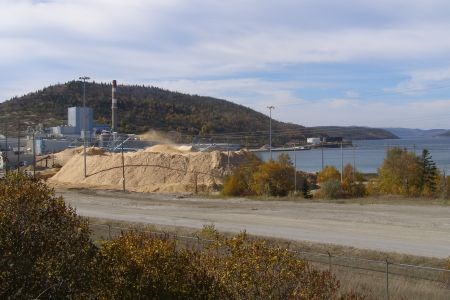Marathon mayor Rick Dumas is not happy with the Ontario province following a decision to transfer the area's wood allocation to a proposed jet fuel refinery project in nearby community.
The northwestern Ontario town of 3,800 on the shores of Lake Superior has been working with Toronto company, Protocol Biomass, on a specialty wood pellet project that would revive a shuttered pulp mill and create 150 jobs.
Dumas said the former Marathon Pulp mill's historical allocation has been shifted by the province an hour's drive down the Trans-Canada Highway to White River. There, California-based Rentech and the Ontario government announced plans to produce 85 million litres annually of low carbon jet fuel at a former Domtar mill site.
The proposed venture, with partial Aboriginal ownership, would employ 383 direct and indirect jobs in the White River area when the operation starts in 2015.
Rentech was awarded 1.1 million cubic metres of wood through the province's Crown wood supply competition, a good chunk coming from Marathon Pulp's historical fibre allotment.
In a May 11 statement, Dumas said: “It is extremely discouraging that this process has resulted in some communities being winners and some losers when we have argued adamantly from the start that all communities can be winners if this process is managed correctly.”
The Ministry of Northern Development, Mines and Forestry has not revealed from what Crown management units Rentech's fibre supply would come from, but sources tell Northern Ontario Business it is believed to come from the Big Pic, White River, Nagagami, Magpie Forests, and possibly others.
Dumas said his town has always been staunch supporters from the start of the Ontario government's controversial Bill 151 to modernize forest tenure in the province.
“The most frustrating aspect of this is that if the traditional Marathon fibre allocation would have been granted to us...the (Protocol) mill deal would be done by now and people would have back to work.”
Marathon's torrefied wood pellet project would use 600,000 cubic metres of Crown wood that was traditionally alloted to the former Marathon Pulp operation, which closed in 2009.
Protocol is pitching their roasted pellet as a green substitute for coal.
The town had formed a joint venture with Manitouwadge and Pic River First Nation to create a corporation to keep local control of wood supply and sell fibre to companies like Protocol. Pic River is now involved with the Rentech-White River project.
Dumas said regardless of the setback, Marathon and the company will forge ahead with their plans and search for additional fibre.
“We, along with Protocol, have not asked the government for one cent to make this deal happen. All we have asked for is a nominal amount of fibre that has traditionally been allocated to Marathon.”




